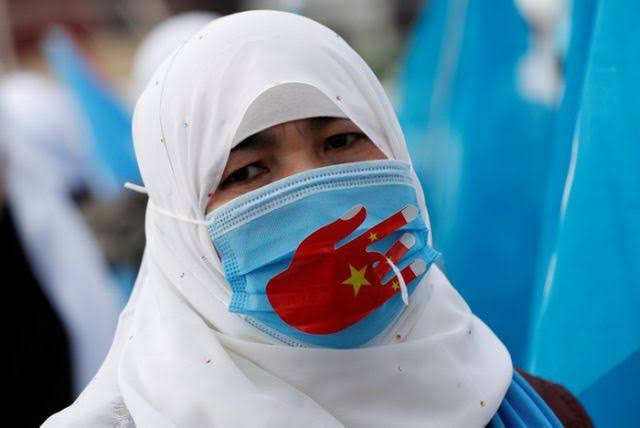Looming China extradition deal worries Uighurs in Turkey
Istanbul (Reuters) – Joining hundreds of women in Istanbul to protest at China’s treatment of Uighurs, Nursiman Abdurasit tearfully thinks of her jailed mother in Xinjiang and fears that Uighurs like her in Turkey may one day be sent back under an extradition deal.
Beijing approved an extradition treaty between the two nations in December and with the deal awaiting ratification by Ankara’s parliament, activists among some 40,000 Uighurs living in Turkey have stepped up efforts to highlight their plight.
Abdurasit came to Turkey to study in 2015 and lost contact with her family four years ago. Last summer she discovered her parents and two brothers had been given long jail sentences on suspicion of unspecified “terrorism-related activities”.
“I have been living with the knowledge that my mother has been in a detention centre for the last four years, experiencing repression,” she said at a protest to mark Women’s Day on an Istanbul seafront, near China’s Istanbul consulate.
The headscarved 32-year-old said she recalled International Women’s Day was her mother’s happiest day, when the family would give her presents, until she received the 13-year jail sentence.
Around her, the 1,000-strong crowd held up photos of missing relatives and waved the blue-and-white flags of the independence movement of East Turkestan, the name by which the movement refers to Xinjiang.
U.N. experts estimate at least a million Uighurs and other Muslims are held in detention centres in northwest China’s Xinjiang region and the United States said in January China has committed “genocide and crimes against humanity” by repressing Uighurs.
China denies accusations of abuses in Xinjiang, and has said the complexes it set up in the region provided vocational training to help stamp out Islamist extremism and separatism.
“China says that what we are doing is a crime, ‘what you are doing is separatism, disparaging the state’,” said Abdurasit, voicing concern about the consequences of the extradition deal waiting in a Turkish parliamentary commission.
“If this agreement is ratified, we could be extradited for this crime. So we are worried,” said the woman, who lives in a small Istanbul flat with her Uighur husband and six-year-old daughter.
Worries among Uighur Muslims living in Turkey have been exacerbated by Ankara’s dependence on China for COVID-19 vaccines, having received 15 million doses from China’s Sinovac Biotech and ordered tens of millions more.
However, Turkish Foreign Minister Mevlut Cavusoglu has denied that the extradition agreement would lead to Uighurs being sent back, describing it as a routine according similar to ones Turkey has with other countries.
A Chinese embassy spokesperson said last month that Uighurs who have been holding regular protests near China’s diplomatic premises in Turkey in recent months were trying to deceive Turkish people and damage bilateral relations.
“These people’s aim with their made-up lies is to attack the Chinese government’s Xinjiang policies, blacken China’s image and exploit the problems related to Xinjiang,” he said.
The embassy did not immediately respond to a request for comment about the protest on Monday.



